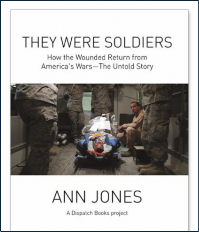![]()
July 2014 Philadelphia Chapter of Pax Christi U.S.A.
![]()
A Review of Ann Jones’ They Were Soldiers…

![]()
![]()
Ann Jones' new book, They Were Soldiers: How the Wounded Return from America's Wars -- The Untold Story, is a firsthand account of soldiers' lives after they fought in Iraq and Afghanistan. At 73, Jones embedded on an American forward operating base to experience what that war was like for the
U.S. troops in the field. She followed grievously wounded American soldiers from the moment they came off the battlefield, accompanying them in transport planes from the Craig/Bagram AFB hospital in Afghanistan, to Landstuhl in Germany and finally to Walter Reed Medical Center. Her journey proved to be nothing short of an odyssey.
Jones interviewed medical personnel at Walter Reed in particular. A surgeon told her that in Iraq the U.S. troops "had severe injuries, but the injuries were still on the body." In Afghanistan, troops step on mines and IEDs. Those who do survive are without one or two limbs, have a brain injury, a ruined face, or all of the above. The emotional damage goes without saying. "By early 2012," Jones writes, "3,000 [U.S.] soldiers had been killed by IEDs in Iraq and Afghanistan, and 31,394 wounded.”
Despite the sometimes glorifying talk about our “wounded warriors,” the government and its media outlets have not offered us this view of the reality facing those who fight in these wars and their families, the genuine cost of war to Americans. Jones also relates the kinds of mindsets soldiers are trained to cultivate in order to fight and then endure the physical and often mental damage they will live with for the rest of their lives. During her extensive time spent with the activist/mother of one severely injured soldier, Jones notes that the woman quoted Martin Luther Link Jr. when he compares the military experience to the training of slaves to obey, follow orders, submit and become completely dependent on one's “superiors.” That dependency follows severely injured soldiers through the rest of their lives.
Finally Jones reminds us that it is war itself that makes these stories real. “While the U.S. would have us believe war is inevitable, most nations don't make war anymore except when coerced by the United States to join some spurious 'coalition.' The earth is so small, and our time here so short. No other nation on the planet makes war as often, as long… as expensively, as destructively, as wastefully, as senselessly, as the United States. No other nation makes war its business."
Ann Jones has written these stories with compassion and clarity, the tragedies we as U.S. citizens are supposed to evade. We cannot keep our own humanity and continue to forget both the victims in our midst and those in the countries where the wars are made – Iraq, Afghanistan, Pakistan, and on and on.
Marge Van Cleef
Marge is on WILP’s Disarm/End Wars Issue Committee, she is a member of Resister Sisters and vigils with CPF on Tuesdays
![]()
1